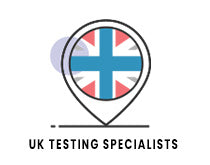Can You Drink Tap Water in London? Safety, Quality & Testing Guide 2025

Planning a trip to London and wondering if it's safe to drink London tap water? Maybe you live in London and are currently drinking bottled water, either way we've got you covered. While London’s tap water meets rigorous safety standards, it has unique characteristics that sometimes raise concerns about its taste, mineral content, and potential contaminants. This article explores whether you can drink tap water in London, what’s in it, and why you might consider testing your water to ensure it meets your specific needs.
Is Tap Water in London Safe to Drink?
The short answer is yes—London’s tap water (like most uk tap water) is safe to drink. Water companies in the UK must adhere to strict quality standards set by the Drinking Water Inspectorate (DWI), ensuring that water is free from harmful levels of bacteria, chemicals, and other contaminants.
The water supplied to London homes is mainly sourced from the river Thames. Greater London is supplied by four water companies, Thames Water (76% of population), Affinity Water (14%), Essex and Suffolk Water (6.6%) and SES Water (3.7%). Water undergoes rigorous treatment processes, including filtration, disinfection, and regular testing. According to the latest reports, more than 99.9% of tests on London’s tap water meet or exceed the regulatory standards.
Why Do People Question Its Safety?
Despite its safety, some people question London’s tap water quality for several reasons:
- Taste and Odor: The presence of chlorine, which is added to disinfect the water, can give it a distinct taste or smell that some find unappealing.
- Hard Water: London’s water is considered “hard” due to its high mineral content, which can lead to limescale buildup and a different mouthfeel compared to softer water.
- Older Infrastructure: Some areas of London still have older plumbing systems, including lead pipes, which can pose risks in certain situations.
By understanding these factors, you can make an informed decision about drinking tap water in London and whether additional testing or treatment is necessary for your household.
What is in London’s Tap Water?
London’s tap water contains a mix of natural and treated elements that make it both safe to drink and distinct in taste. Here are the key components:
Minerals and Hard Water
London’s water is naturally “hard,” meaning it contains calcium and magnesium from the region’s chalk and limestone geology. These minerals are completely safe to consume and can even contribute to your dietary intake of essential nutrients. However, hard water does have some downsides, such as limescale buildup in kettles, boilers, and washing machines, which can reduce their efficiency over time.
Chlorine for Disinfection
Chlorine is added during the water treatment process to kill bacteria and viruses. The levels of chlorine are tightly regulated and kept well below harmful thresholds. However, some residents report a mild chlorine taste or odour in their tap water. Allowing water to sit for a few minutes or using a water filter can often resolve this issue.
Trace Metals
Trace amounts of metals such as iron or copper may leach from the water pipe, but are generally harmless. However, properties with older lead pipes or solder can experience lead contamination, which poses significant health risks, particularly for children and pregnant women. If your home was built before 1970, testing your water for lead is a wise precaution.
Common Concerns About London Tap Water
While London’s tap water is safe to drink, it does have characteristics that may prompt some people to take extra steps to ensure their water meets personal preferences or addresses specific health concerns.
Lead Pipes and Lead Contamination
One of the most pressing concerns is the presence of lead pipes in older properties. Lead can leach into the water supply, particularly if the pipes are corroded or water has been sitting in the pipes for a long time. The only way to confirm the presence of lead in your tap water is through testing. If lead is detected, replacing old pipes and using filters certified to remove lead are effective solutions.
Taste and Odor
The chlorine used to disinfect water can sometimes impart a noticeable taste or smell. While chlorine is necessary to keep water free from harmful microbes, the residual taste may not be pleasant for everyone. Simple fixes include using activated carbon filters or letting water sit in an open container to allow the chlorine to dissipate.
Limescale and Hard Water
London is located in the south east of England which is a hard water area. The high mineral content of London’s tap water causes limescale to form on appliances and fixtures. While limescale isn’t harmful to drink, it can be a nuisance in daily life, leading some people to invest in water softeners or filters. For those concerned about the taste or appearance of their water, these devices can be an effective solution.
What Do Water Quality Reports Say About London’s Tap Water?
Water companies in London are required to publish annual water quality reports detailing the results of their tests. These reports provide a wealth of information about the water supply, including levels of:
- Microbial contaminants, such as bacteria and viruses.
- Chemical substances, including nitrates, chlorine, and trace metals.
- Hardness, which varies depending on your location in London.
The reports consistently show that London’s tap water meets or exceeds legal safety standards. They also highlight efforts to minimize potential risks, such as reducing lead levels through the addition of phosphate, which coats the inside of pipes to prevent leaching.
If you’re curious about the specific quality of your local tap water, you can request a report from your water supplier or visit their website for detailed information.
Should You Test Your Tap Water in London?
While London’s water supply is safe and regularly monitored, there are situations where testing your water might be beneficial. Testing provides a clear picture of what’s in your tap water and can help you address specific concerns.
When Should You Test Your Water?
- Older Properties: Homes built before 1970 may have lead pipes or plumbing that increases the risk of lead contamination.
- Health Concerns: If someone in your household has a compromised immune system or is particularly vulnerable to contaminants, testing can provide peace of mind.
- Unusual Taste or Appearance: If your tap water has a persistent taste, odour, or discoloration, testing can help identify the cause.
By testing your water, you can identify any potential issues and take steps to address them, such as installing filters or replacing old plumbing.
Tips for Improving the Quality of London Tap Water
If you’re not satisfied with the taste or quality of your tap water, there are several steps you can take to improve it:
- Filter Your Water: Activated carbon filters can remove chlorine taste and odour, as well as some contaminants like lead or microplastics.
- Drink from the Kitchen: Always drink from the kitchen tap where possible and where possible, avoid drinking form the bathroom tap.
- Install a Water Softener: For those dealing with hard water, a water softener can reduce limescale and improve the performance of appliances.
- Flush Your Taps: If water has been sitting in your pipes for an extended period, flushing the taps for a minute can improve its taste and quality.
- Use a Water Jug: Letting water sit in a jug in the fridge can reduce the chlorine taste, remove harmful metals, and provide refreshing, chilled water.
These simple measures can help ensure your water meets your preferences, even if it’s already safe to drink.
Conclusion
London’s tap water is safe, thoroughly tested, and meets stringent regulatory standards. While factors like hard water, chlorine taste, or older plumbing can influence its perception, these issues are generally manageable. By understanding what’s in your tap water and addressing specific concerns, you can enjoy clean, safe drinking water with confidence.
If you’re curious about the quality of your tap water or have concerns about specific contaminants like lead, consider testing your water for peace of mind. Our water testing kits make it easy to identify potential issues and take action to ensure your water is as safe and enjoyable as possible.




















